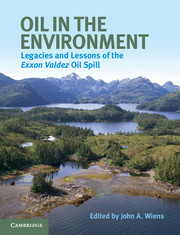Crossref Citations
This Book has been
cited by the following publications. This list is generated based on data provided by Crossref.
ESA
2014.
journals and Monographs Received.
Ecology,
Vol. 95,
Issue. 3,
p.
793.
Wiens, John
2014.
The Exxon Valdez oil spill at 25 years: What have we learned?.
Integrated Environmental Assessment and Management,
Vol. 10,
Issue. 3,
p.
471.
Boehm, Paul D.
Page, David S.
Brown, John S.
Neff, Jerry M.
and
Gundlach, Erich
2014.
Long-Term Fate and Persistence of Oil from the Exxon Valdez Oil Spill: Lessons Learned or History Repeated?.
International Oil Spill Conference Proceedings,
Vol. 2014,
Issue. 1,
p.
63.
2016.
Ecological Challenges and Conservation Conundrums.
p.
301.
Shepherd, John
Benoit, Debra
Halanych, Kenneth
Carron, Michael
Shaw, Rick
and
Wilson, Chuck
2016.
Introduction to the Special Issue: An Overview of the Gulf of Mexico Research Initiative.
Oceanography,
Vol. 29,
Issue. 3,
p.
26.
Choquet, Anne
2018.
Interdiction de l’exploitation minière en Antarctique, une réalité menacée ?.
Natures Sciences Sociétés,
Vol. 26,
Issue. 1,
p.
49.
Hatami, Rezvan
2019.
A Review of the Techniques Used to Control Confounding Bias and How Spatiotemporal Variation Can Be Controlled in Environmental Impact Studies.
Water, Air, & Soil Pollution,
Vol. 230,
Issue. 6,
Hook, Sharon E
2020.
Beyond Thresholds: A Holistic Approach to Impact Assessment Is Needed to Enable Accurate Predictions of Environmental Risk from Oil Spills.
Integrated Environmental Assessment and Management,
Vol. 16,
Issue. 6,
p.
813.
Cheng, Yaoze
Zhang, Yin
and
Dandekar, Abhijit
2021.
Experimental Investigation of Hybrid Techniques for Enhancing Alaska North Slope Viscous Oil Recovery.
Shareefdeen, Zarook
and
Bhojwani, Janak
2022.
Hazardous Waste Management.
p.
27.
Cheng, Yaoze
Zhang, Yin
Dandekar, Abhijit
and
Li, Jiawei
2022.
An Experimental Study of Improving Viscous Oil Recovery by Using Hybrid Enhanced Oil Recovery Techniques: A Case Study of Alaska North Slope Reservoir.
SPE Journal,
Vol. 27,
Issue. 01,
p.
820.
Vives-Gabriel, Jordi
Schrempf-Stirling, Judith
and
Coraiola, Diego M.
2024.
Dealing with Organizational Legacies of Irresponsibility.
Academy of Management Perspectives,
Čović, Maja
Ricci, Stefano
Jelaska, Igor
and
Stanivuk, Tatjana
2024.
Oil spill trajectory modeling and validation: case study on a marine incident at Adriatic Sea.
WMU Journal of Maritime Affairs,
Vol. 23,
Issue. 1,
p.
103.





